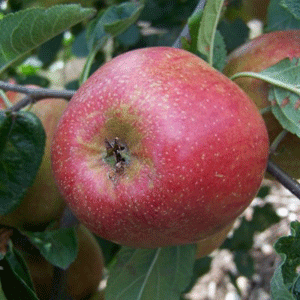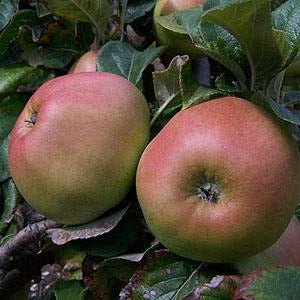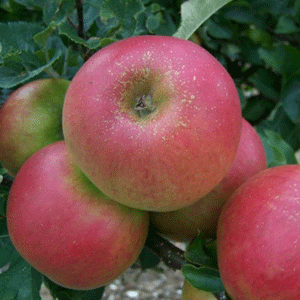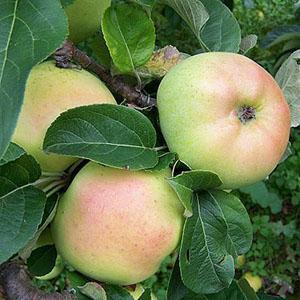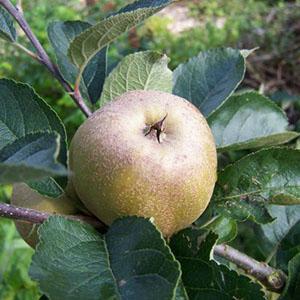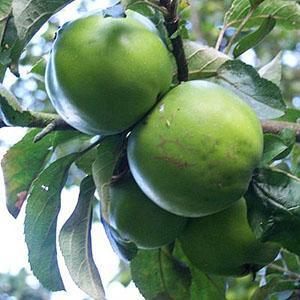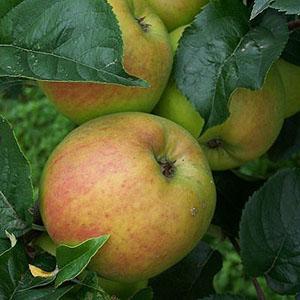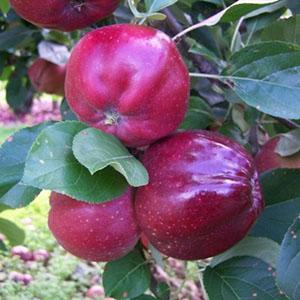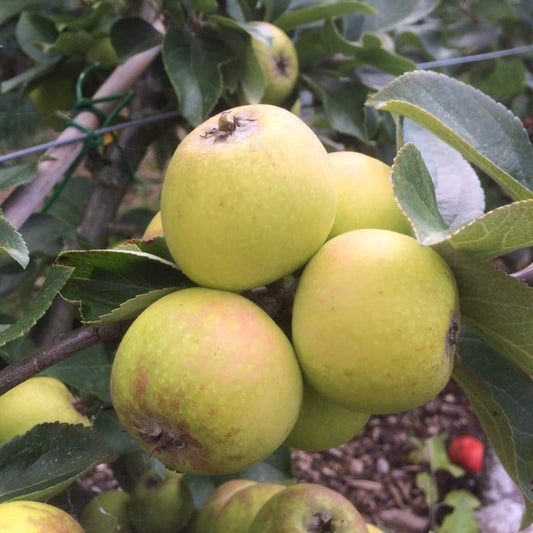Collection: Heritage Apple Trees
Why Buy Heritage Apple Trees?
It has been difficult to find many of our heritage apple trees for sale, as a lot of traditional fruit tree nurseries closed. I'm so pleased to see good young growers setting up now, after many years of the industry's steady decline.
It's also because these apple store badly, or bruise when travelling, or look funny, or the trees don't yield enough. Tastes have changed; we don't cook as much so don't need different varieties of cookers, and people prefer sweet eating apples. There's an element of Catch 22 as well - because we don't eat traditional old apple varieties we're unfamiliar with them, and don't plant heritage apple trees as a result.
We think that's a terrible shame, and not just because they can taste so delicious (some, of course, did not!).
Britain has a rich and ancient history of growing apples and has the perfect climate for them; there are varieties listed here from all over the country. Our heritage apples are associated with the areas - or even villages - they come from. Here in Somerset we are in cider land, and are surrounded by villages with their own apple varieties - Yarlington Mill, Kingston Black... We offer over 100 varieties of apple tree and keep on adding to our list, but there are many more - and some very good ones - still out there. And this is just the tip of the iceberg!
Many varieties have their own stories to tell. You can find the apples Captain Cook took on his voyages here, or, incredibly, even buy direct descendants from the tree under which Isaac Newton sat.

Value For Wildlife
Apple orchards - even just a few trees - are brilliant for wildlife. They're one of our richest habitats and home to an army of flying, creeping, buzzing, knocking, animals.Although their value improves with age, young trees are pretty good too. Pollinators, particularly bees, enjoy the spring blossom.
The unimproved grassland under apple trees provides nest sites for some of them as well, along with many other animals too. Wildflowers there provide more forage during the summer months.
Apple orchards have a secret underground world too; their undisturbed soil is home to all sorts of flora and fauna. Apple trees don’t last very long, and decaying wood provides a wonderful habitat for all sorts of sometimes rare and always fascinating animals. Lots of fungi too. In the autumn fallen apples are a feast for mammals and birds, as well as late flying butterflies and other invertebrates.
Other kinds of heritage fruit trees - not just apple trees - can produce the same effects, of course.
Which Apple Trees Should I Buy, And When?
Have a look at our guide to planting, which will explain apple rootstocks and planting distances, and pollination groups. You'll also find lots of helpful advice in the links below and in our FAQs. Our apple trees are all supplied as young bare root plants, so they're only available from November to the end of March - i.e. when they are dormant. You can reserve them in the nursery in advance of this period, however.
Our Apple Trees For Sale
We source over 100 varieties of apple tree from several specialist traditional nurseries in the UK, so they are ALL British grown and - we hope! - high quality. There aren't many fruit tree nurseries left here, and we think it's important to support them and the varieties they sell.
Oh - none of our nurseries use peat. They're not organically certified - at least as yet - but only use minimal quantities of chemicals and continue to reduce their use further. We can let you know about exactly what each nursery does use if you would like.
Apple Trees Advice & Guides
Choosing your apple trees
The questions you need to answer to decide which variety is for you.
How do I store apples?
How to pick and store apples, and which varieties store best.
Why heritage apple trees?
Good reasons to buy British apple trees
Planting bare root plants (Video)
Our video guide on how to plant your bare root apple plants.
-
Apple Tree - Adam's Pearmain
Regular price £30.95Regular priceUnit price / per -
Apple Tree - Alfriston
Regular price £30.95Regular priceUnit price / per -
Apple Tree - Allington Pippin
Regular price £30.95Regular priceUnit price / per -
Apple Tree - Anglesey Pig's Snout
Regular price £50.00Regular priceUnit price / per -
Apple Tree - Annie Elizabeth
Regular price £30.95Regular priceUnit price / per -
Apple Tree - Arthur Turner
Regular price £30.95Regular priceUnit price / per -
Apple Tree - Ashmead's Kernel
Regular price £30.95Regular priceUnit price / perApple Tree - Ashmead's Kernel
Regular price £30.95Regular priceUnit price / perApple Tree - Ashmead's Kernel
Regular price £30.95Regular priceUnit price / per -
Apple Tree - Balsam
Regular price £30.95Regular priceUnit price / perApple Tree - Balsam
Regular price £30.95Regular priceUnit price / perApple Tree - Balsam
Regular price £30.95Regular priceUnit price / per -
Apple Tree - Bardsey Island
Regular price £52.00Regular priceUnit price / per -
Apple Tree - Beauty of Bath
Regular price £30.95Regular priceUnit price / per -
Apple Tree - Black Dabinett
Regular price £41.50Regular priceUnit price / perApple Tree - Black Dabinett
Regular price £41.50Regular priceUnit price / perApple Tree - Black Dabinett
Regular price £41.50Regular priceUnit price / per -
Apple Tree - Blenheim Orange
Regular price £30.95Regular priceUnit price / perApple Tree - Blenheim Orange
Regular price £30.95Regular priceUnit price / perApple Tree - Blenheim Orange
Regular price £30.95Regular priceUnit price / per -
Apple Tree - Bloody Ploughman
Regular price £30.95Regular priceUnit price / per -
Apple Tree - Bringewood Pippin
Regular price £57.00Regular priceUnit price / per -
Apple Tree - Brith Mawr
Regular price £52.00Regular priceUnit price / per -
Apple Tree - Brown's
Regular price £41.50Regular priceUnit price / perApple Tree - Brown's
Regular price £41.50Regular priceUnit price / perApple Tree - Brown's
Regular price £41.50Regular priceUnit price / per



